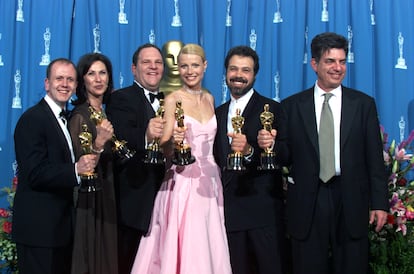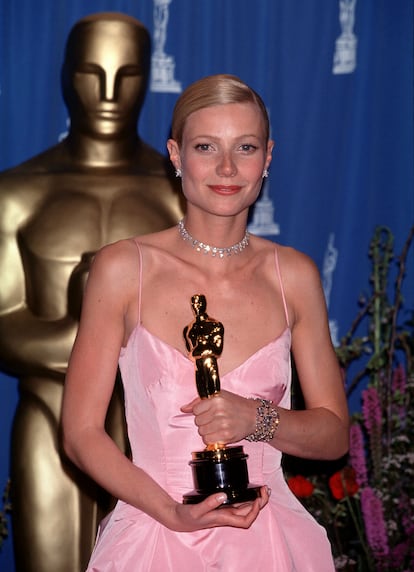‘Shakespeare in Love’: From Julia Roberts’ $6 million walkout to Harvey Weinstein’s threats
The 1998 movie was nominated for 13 Oscars and won seven gongs. But between the first screenplay and its winning spree, there were contract break-ups, lifelong feuds and the black hand of the most hated man in Hollywood

In 1996, Legends of Passion director Edward Zwick was in a hotel room across the street from his dying father in the Michael Reese Hospital in Chicago, when he received a call: “You think you can sue me, you prick? You don’t know who you’re dealing with. I’m going to ruin you,” said the voice on the other end of the line. “Hello, Harvey,” Zwick replied. “I’m going to make sure you never work again!” Harvey Weinstein went on. “It’s midnight, Harvey, my father is sick, it’s not a good time.” But Weinstein wasn’t prepared to cut him any slack. Instead, he said, “Oh, you’re sensitive. I’ve hurt your feelings. Fuck you. I’ll kill your whole family, you little fuck.” To which Zwick replied, “Nice talking to you, Harvey. See you in court.”
To understand what lay behind that call, let’s go back to the early 1990s, to the moment when Edward Zwick met screenwriter Marc Norman, who told him he was working on an idea: the story of when William Shakespeare wrote Romeo and Juliet. Zwick had received his first nomination for best director in 1989 at the Golden Globes for the film Glory, a historical drama set during the American Civil War, starring Denzel Washington. And he was interested in Norman’s idea. Next, Universal Studios decided to pay them to develop the script and Norman added the romantic and pivotal element — Shakespeare falling in love while writing one of the most famous love stories of all time, “but as well-written as that script was, it lacked the wit and insight of a Shakespeare comedy,” wrote Zwick in a piece for The Air Mail newsletter, entitled, precisely, Not To Be, in which he recounted the ins and outs of the making of the 1998 movie Shakespeare in Love, which he never got to direct.
To achieve Shakespearean wit and insight, the director proposed to Universal that they hire the prestigious and acclaimed Czech-born British playwright Tom Stoppard to polish the script. Stoppard, who had extensive experience in London theatre, said he would accept in exchange for $1 million. Universal said no way. “Until Julia came into the picture, that is,” writes Zwick. “Someone, possibly her manager or agent, had gotten wind of the project and intimated to Universal that Julia might be interested in starring in a period rom-com, possibly this one.” Julia was, of course, Julia Roberts, who had starred in Pretty Woman in 1990 and had appeared in box office hits such as Steel Magnolias and The Pelican Brief, and was now officially America’s new sweetheart. Universal signed the deal with Stoppard, the script was completed and, in 1991, production began. The director, writers and the lead actress flew to England. Locations were secured all over London, other enclaves were built and work began on costumes. But one key element was missing: the Romeo.
At that time, Julia Roberts — and possibly her agent — were already working on a strategy that would lead to her role as Erin Brockovich and the 2001 Oscar for Best Actress. This included sharing the bill with critically respected and, if possible, award-winning actors. Roberts decided that Romeo should be played by Daniel Day-Lewis, who in 1990 had won the Best Actor Oscar for My Left Foot. The problem was that he had just committed to his close friend Jim Sheridan’s project, In the Name of the Father. And despite Roberts’ charm and numerous overtures — she even sent him a bouquet of roses with the note “Be my Romeo” — Day-Lewis would not budge.

Zwick says that the Irish actor’s stance left Roberts devastated. And it didn’t matter after that who was put forward to be her Romeo — the names included Hugh Grant, Rupert Graves, Colin Firth, Sean Bean and even Ralph Fiennes, the brother of the final Romeo, Joseph Fiennes — because Roberts didn’t even bother to properly read the script she had in front of her for the audition. What’s more, according to Zwick, she didn’t even fake a British accent and read her lines with a strong American twang.
One morning, Zwick noticed that the actress had left her hotel room. After trying to track her down, he finally called Tom Pollock, one of Universal’s bosses. Pollock informed him that Julia Roberts had decided to leave the project and, although they tried to persuade her otherwise, it looked as though her mind was set. “Can she do this? We’ve already spent millions!” Zwick asked him. “Six million, in fact,” the producer revealed. Yes. It was Julia Roberts, and she could do it. The production was cancelled.
Universal still had the rights to the film, but without a name like Julia Roberts, and with an initial hole of $6 million, there was little that could be done. Shakespeare in Love was shelved. Until Weinstein, head of Miramax, moved into the picture.
Weinstein became interested in Zwick’s work after seeing Legends of Passion. The director says that they met for a drink and Weinstein told him that he would be happy to produce anything he had in mind. Zwick then told him about Shakespeare in Love. Weinstein called Universal but when he found out about the $6 million hole, he stopped speaking to Zwick. “For the next four or five years, I showed that script, often more than once, to every studio that had any money. They all said no,” Zwick explains. One day in 1996, while in New York scouting locations for his next film, he read the news that Harvey Weinstein and Miramax had bought the rights to shoot Shakespeare in Love the following year. No one had informed him of this, so Zwick contacted his lawyers. Cue for the threatening phone call Weinstein made to Zwick when his father was dying.
In 1996, Gwyneth Paltrow, a young, tanned blonde with preppy Californian appeal, was the hottest girl in Hollywood. The 1995 horror movie Seven, in which she co-starred with her then-partner Brad Pitt, had brought her fame and kudos. The following year saw the release of Paul Thomas Anderson’s Emma, based on Jane Austen’s novel of th. “There’s a story I’ve heard a couple of times—it may be apocryphal,” writes Zwick. “About how Harvey’s interest was rekindled in the project enough to pursue the rights. It seems there was a moment in which Winona and Gwyneth were best friends, and while staying at Winona’s house, Gwyneth happened upon the script of Shakespeare in Love I had sent to Winona. And Gwyneth, having made six or seven movies for Miramax while becoming Harvey’s go-to movie star and resident muse, told him she wanted to do it.” It ended the friendship. But Gwyneth got the role of Viola de Lesseps in the long-awaited Shakespeare in Love.

Zwick was no match for Weinstein. After receiving threats and being blackmailed by the all-powerful producer, he stepped aside or, rather, settled for crumbs. Coincidentally, the shooting of Shakespeare in Love coincided with the shooting of the film Zwick was working on, The Siege, a thriller starring, once again, Denzel Washington with Annette Bening and Bruce Willis. Zwick later learned that this was a ploy by Weinstein to keep him away from his own film. “Among the many things Harvey promised was to include my central role as producer in all press releases and to feature me in every major interview about the genesis of the movie,” says Zwick. “In exchange, Marshall Herskovitz, my partner in the Bedford Falls Company, nobly agreed to have his producer credit replaced by Donna Gigliotti and David Parfitt. The Bedford Falls Company presentation credit would remain.” Bedford Falls Productions appears, as Weinstein promised, “over the shot of a foot stepping in a pile of horseshit — a classy move,” says Zwick.
Shakespeare in Love was released on December 11, 1998, directed by John Madden. It grossed $100 million in the U.S. alone. Worldwide, it grossed $289 million. It had cost Miramax $25 million. It was a huge success in the U.K., received global critical acclaim and was nominated for 13 Oscars, making it the film with the most nominations that year. But the Oscar ceremony was also marred by controversy. Shakespeare in Love’s biggest competitor was Saving Private Ryan, directed by Steven Spielberg. The former took the Best Picture gong, the latter won Best Director. Harrison Ford was in charge of announcing it: Edward Zwick came on stage to collect the award, visibly uncomfortable next to the rest of the producers, Donna Gigliotti, Marc Norman, David Parfit and Harvey Weinstein. He was the only one who did not speak.
Its success was seen in Hollywood as engineered by Harvey Weinstein’s own aggressive promotional campaign. If you are familiar with the phrase “Saving Private Ryan is only worth the first 15 minutes,” you should know that this phrase was coined by Weinstein. Paltrow was awarded the Oscar for Best Actress that night, beating Cate Blanchett for her role in Elizabeth. “I want to thank Harvey Weinstein and all the people at Miramax Films for their incredible support,” she said in her thank-you speech, dressed in pink Ralph Lauren. Judi Dench received an Oscar for Best Supporting Actress for her eight-minute portrayal of Queen Elizabeth in the film that also won awards for Best Screenplay, Best Art Direction, Best Costumes and Best Score. With those seven awards, it was crowned the night’s big winner. Saving Private Ryan won five.
Some years later, Gwyneth Paltrow’s role in Weinstein’s life would be very different. As revealed in the book She Said, Gwyneth Paltrow became a key figure in exposing Harvey Weinstein’s abuse and setting in motion the #MeToo movement that would throw Hollywood into turmoil. She was one of the main sources for journalists Jodi Kantor and Megan Twohey, who published the results of their investigations in a series of articles in The New York Times. The one-time king of Hollywood is currently serving time at the Twin Towers Correctional Facility in downtown Los Angeles for raping numerous women when he was at the top of his game. In 2015, The Hollywood Reporter polled hundreds of members of the Academy of Motion Picture Arts and Sciences, asking them to re-cast their votes in historic contests, in a referendum on which films had best stood the test of time. They chose Saving Private Ryan over Shakespeare in Love.
Sign up for our weekly newsletter to get more English-language news coverage from EL PAÍS USA Edition
Tu suscripción se está usando en otro dispositivo
¿Quieres añadir otro usuario a tu suscripción?
Si continúas leyendo en este dispositivo, no se podrá leer en el otro.
FlechaTu suscripción se está usando en otro dispositivo y solo puedes acceder a EL PAÍS desde un dispositivo a la vez.
Si quieres compartir tu cuenta, cambia tu suscripción a la modalidad Premium, así podrás añadir otro usuario. Cada uno accederá con su propia cuenta de email, lo que os permitirá personalizar vuestra experiencia en EL PAÍS.
¿Tienes una suscripción de empresa? Accede aquí para contratar más cuentas.
En el caso de no saber quién está usando tu cuenta, te recomendamos cambiar tu contraseña aquí.
Si decides continuar compartiendo tu cuenta, este mensaje se mostrará en tu dispositivo y en el de la otra persona que está usando tu cuenta de forma indefinida, afectando a tu experiencia de lectura. Puedes consultar aquí los términos y condiciones de la suscripción digital.









































